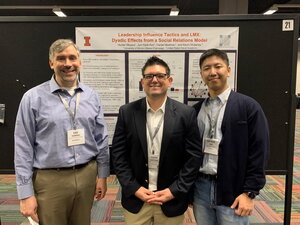
Hello! My name is Hunter Meyers, and I study industrial-organizational psychology under the guidance and mentorship of Dr. Dan Newman and Dr. Jun-Yeob Kim, an alum of the Master of Science in Psychological Science (MSPS) and Industrial-Organizational PhD programs. Together, we are investigating the role of influence on perceived leadership ability and how these perceptions differ based on the gender of the influencer.
My background is different than most people who join the MSPS program. At the United States Military Academy, I majored in American Politics and had no formal training in psychology. Additionally, my undergraduate program emphasized calculus rather than statistics. I had only taken one stats course ten years prior to starting the program! I had also been removed from academia for eight years, serving in various positions worldwide. Despite my atypical background, I joined the MSPS program to prepare for my next military assignment—to teach psychology at West Point—and to study the complexities of leadership and gender, a topic that I wanted to understand more deeply as I continue my military career. Today, as I prepare to graduate from the MSPS program, I have grown significantly in my understanding of statistics, methods, and programming; I have conducted original research on leadership and gender; and I have become more comfortable with academic reading, writing, and communication.
I would like to share my experience with my greatest area of growth – developing science communication skills. Effective science communication makes one’s research accessible, relatable, and understandable. As a part of the professional development program, my cohort participated in a six-week science communication workshop to explore ways to describe our research to anyone. As someone who uses complex methodology – social relations analysis – to investigate the nuances of gender and leadership, I initially struggled with making my research accessible to people from different backgrounds. During the workshop, we did exercises that challenged me to think about my research in new ways. In one activity, we were tasked with explaining our research to different audience members. I received an art student, so I had to consider how my work is represented in art. I drew a comparison between my research and the Disney movie, Mulan. More specifically, I recounted the gender norms Mulan rebels against in joining the Chinese army and her exceptional performance as a trainee, which her leadership dismisses upon finding out she is a woman. This story mirrors the leadership struggles many women face today. In another activity we were challenged to creatively communicate our research to a broad audience. These efforts culminated in the creation of a research zine—a small, brochure-like pamphlet that includes drawings, words, and infographic displays. You can check out the first annual MSPS zine here (if you look at mine, please note I chose psychology and not art for a reason).
In addition to helping me communicate my work to a broad audience, learning science communication strategies supported my goal to become an effective teacher and mentor. During the MSPS program, I sought opportunities to develop teaching skills in preparation for my teaching assignment. In our professional development course, Dr. Tancredy encouraged us to gain experience with developing mentorship skills. For me, exploring mentorship led me to develop verbal and written communication skills and to build empathy. I considered how to reach mentees and people who are new to psychological science. I applied these skills as a guest lecturer at a local community college, as a guest speaker for the junior MSPS cohort, and as a mentor to high school and undergraduate students. Due to my mentorship training and practice, I earned the Graduate College’s Mentoring Certificate.
The MSPS program epitomizes the tenants of science communication; Dr. Tancredy meets each student where they are and finds innovative ways to inspire curiosity and passion. Her devotion – coupled with the mentorship of Dr. Dan Newman, Dr. Jun-Yeob Kim, and numerous professors throughout the community – eased a difficult transition and allowed me to be an active contributor to scientific progress in my field. As I move into my role as an instructor, I aim to similarly inspire curiosity and passion in my students.
Today, I can proudly say my experiences in the MSPS program cultivated sound methodological principles, the ability to engage with and answer meaningful questions, mentor curious and motivated students, become a better educator, and share these gifts with others. Whatever my future holds at the United States Military Academy, I know I am prepared.